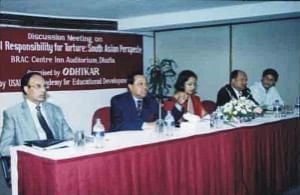South
Asian Network Against Torture and Impunity (SANTI) reactivated
Sultana
Razia
On October 11, 2004,
a day long discussion meeting on ' Criminal responsibility for torture
: South Asian perspective' was organised in Dhaka by Odhikar, a human
rights organisation, in collaboration with the Academy of Educational
Development (AED).
 Former
chief justice KM Hasan inaugurated the discussion. He suggested codification
of torture as a criminal responsibility. So far, the approach of South
Asian countries to torture has been too soft not reflecting the developments
under international law. According to him, the institution encourages
illegal methods such as torture and effective systems of control are
lacking. So far there has not been any procedural development in investigation
methods and trails. Today the need is felt for reform in the administration
of the justice system to ensure its functioning at the national level.
Former
chief justice KM Hasan inaugurated the discussion. He suggested codification
of torture as a criminal responsibility. So far, the approach of South
Asian countries to torture has been too soft not reflecting the developments
under international law. According to him, the institution encourages
illegal methods such as torture and effective systems of control are
lacking. So far there has not been any procedural development in investigation
methods and trails. Today the need is felt for reform in the administration
of the justice system to ensure its functioning at the national level.
During the inaugural session Law Minister Barrister Moudud Ahmed was
the chief guest and former law minister Abdul Matin Khasru was special
guest, while Dr. Asif Nazrul read out the keynote paper.
Most of the speakers
expressed grave concern over torture in police custody, the deaths of
arrestees in crossfire and the question of accountability of RAB and
other newly formed special law enforcing agencies, Moudud highlighted
the positive role played by the special forces in combating terrorism
and criminal activities.
Khasru claimed that
police has been used by the party in power to reap political benefits
and added that "Our police force is so corrupt that it doesn't
have minimum respect for human rights". He said that the outdated
method of investigation also contributed to torture in police custody.
In the two working sessions, Shushil Pyakurel, Commissioner of the National
Human Rights Commission of Nepal, Basil Fernando (Sri Lanka), Executive
Director of the Hong Kong based Asian Human Rights Commission, Kirity
Roy, Secretary of Banglar Manabadhikar Suraksha Mancha of West Bengal,
Saumya Uma from Women Research & Action Group(WRAG), India, and
Muhammad Masood Ghani of the Human Rights Commission of Pakistan presented
their country papers and took active part in the discussion meeting.
They all agreed that a network could contribute in a much stronger way
to the protection of victims and to the fight against torture. Basil
stressed that to the civil society every human rights violation is news,
regardless of wherever it takes place-- in Sudan or anywhere else in
the world.
The participants
took the decision to reactivate the network named South Asian Network
Against Torture and Impunity (SANTI) which will have the scope to fight
against all kind of excesses in the South Asian region .
Basil Fernando stated that his country is the only one in Asia to have
enacted a law, Convention against Torture Act 1994, against torture,
which provides a minimum sentence of seven years of imprisonment, fines
for crimes of torture and compensation for torture victims. He added
that this codification was made possible by the pressure created by
civil society in Sri Lanka.
Attorney General
Hassan Ariff presided the closing session where deputy leader of the
opposition in parliament Abdul Hamid was chief guest and USAID mission
director Gene V George special guest. Hassan Arif stated that torture
committed by law enforcing agencies is not acceptable. In his opinion
the entire discussion meeting has been focused on the legal aspects
of the issue of torture, following a rights- based approach; he suggested
to adopt a responsibility-based approach which covers also the social,
cultural, psychological aspects of torture. He stressed the need of
victims and witness protection.
The
writer is Law Desk assistant of The Daily Star
Corresponding
with the Law Desk
Please send your mails, queries, and opinions to: Law Desk, The
Daily Star 19 Karwan Bazar, Dhaka-1215; telephone 8124944,8124955,fax
8125155;email <[email protected],[email protected]

 Former
chief justice KM Hasan inaugurated the discussion. He suggested codification
of torture as a criminal responsibility. So far, the approach of South
Asian countries to torture has been too soft not reflecting the developments
under international law. According to him, the institution encourages
illegal methods such as torture and effective systems of control are
lacking. So far there has not been any procedural development in investigation
methods and trails. Today the need is felt for reform in the administration
of the justice system to ensure its functioning at the national level.
Former
chief justice KM Hasan inaugurated the discussion. He suggested codification
of torture as a criminal responsibility. So far, the approach of South
Asian countries to torture has been too soft not reflecting the developments
under international law. According to him, the institution encourages
illegal methods such as torture and effective systems of control are
lacking. So far there has not been any procedural development in investigation
methods and trails. Today the need is felt for reform in the administration
of the justice system to ensure its functioning at the national level.